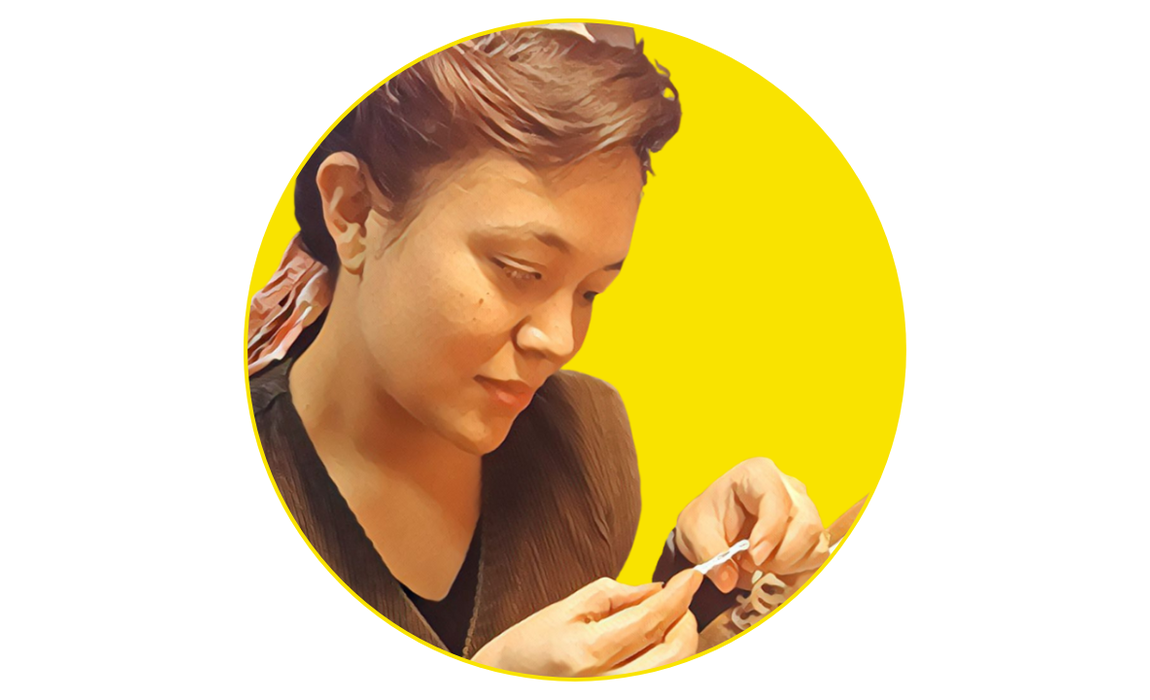Chain Making with Lucie Gledhill
- Date
- 19 Jun 2024 · 9:30AM - 5:00PM
- Price
- £189 (8 places)
- Venue
- Silversmithing Workshop, The Goldsmiths' Centre
- Programme type
- Technical Skills Training
Whether used as embellishment or adornment, chains are one of the most versatile and long-lasting pieces of jewellery. Yet today, chains are often mass produced by machines to satisfy market demand. Lucie Gledhill, an expert in weaving with wire and making chain, will help you to unlock the secret of creating curb chain – a heavy chain particularly popular for men’s jewellery.
This day short course will take you on a twisting journey of interlocked soldered links. Lucie will show you how to make jump ring, turn them into links and solder, before twisting and flattening the chain.
“A really challenging, interesting and rewarding course to learn an under-appreciated skill. Lucie was patient, encouraging and generous with her time and knowledge, and as with all Goldsmiths’ Centre’s courses. I learned far more than simply chain-making, with lots of great advice and new techniques.”
Our small class size offers you the chance to get group as well as individual guidance and 1:1 time with your tutor. You will receive tailored advice to deepen your knowledge and understanding of this technique.
FAQs
Delivered in person at the Goldsmiths’ Centre, this course will help you with:
- Informed material choices: Learning to choose the correct gauge of wire and estimate its quantity empowers you to provide accurate client quotes and minimises wastage. This strategic approach not only enhances cost-effectiveness, but also positions you as a meticulous and reliable jewellery maker.
- Optimised material purchases: Estimating and costing the quantity of metal required for a job is a crucial skill. By mastering this, you can save money when purchasing materials, maximising your profitability while ensuring you have precisely what you need.
- Efficiency in jump ring production: The course imparts efficient techniques to produce jump rings, a foundational component of chains. This proficiency streamlines your production process, allowing you to create more intricate and appealing designs.
- Effective soldering practice: Mastering effective soldering techniques is pivotal. The course not only teaches you how to solder links but also guides you in enhancing your soldering practice overall, resulting in stronger, seamless connections.
- Versatile chain formation: We help you to develop a profound understanding of forming and shaping chains using various tools and equipment. This versatility equips you to create chains of different styles and thicknesses, catering to a broad spectrum of client preferences.
- Time saving finishing practices: Understanding best practices for finishing and polishing chains efficiently is a time-saver. This knowledge ensures that your chains are not only aesthetically pleasing, but also professionally finished.
- Hands-on learning: The course offers step-by-step demonstrations and hands-on practice, supplemented by both individual and group support. This immersive approach ensures you not only grasp theoretical concepts but also build practical skills and confidence.
- Top tips on measuring, forming and soldering.
- Individual and group support guiding you through this practice.
- Step by step demonstration followed by making your own links, soldering and forming a length of chain to build up understanding and confidence.
- Effectively assemble and solder multiple links using traditional techniques.
- Leave the course with a fully formed curb chain ring (time permitting) or enough curb chain and the knowledge to form this into a finger ring in your own studio.
Please bring your own basic tool kit including but not limited to:
- Piercing saw frame and Blades (2/0 or 3/0).
- Rawhide mallet.
- Hand vice.
- Small paint brush for borax application.
- Solder probe or tweezers.
- Tin snips.
- AA tweezers.
- Half Round hand file with handle.
- Set of needle files.
- Set of pliers including parallel, flat, snipe and round nose.
- Protective clothing or clothing you do not mind getting dirty e.g. apron and closed toe shoes.
- Piercing saw frame and Blades (2/0 or 3/0).
Optional:
- Spectacles or head visor (if required) to work on small details.
- Notebook and pen.
- All precious metal (silver) needed to make your links.
- Silver hard solder as required.
- Soldering station including, soldering matt, borax dish and cosne.
- Steel rods to make your links.
- Workshop equipment such as vices, draw bench etc.
- Emery paper.
- Intermediate: Some practical experience and basic understanding of the listed skill required
To benefit most from this course, participants should have experience of being in a workshop environment and able to work independently on basic tasks such as piercing, filling and soldering.
We believe that talent should not be held back. Here at the Goldsmiths’ Centre, we are open, accessible and inclusive to all. Our Access Grants help anyone to build thriving creative careers, supporting jewellers, silversmiths and allied industry practitioners to access our training courses for free.
If you need help to cover fees for our business and technical skills short courses, please apply for one of our Access Grants. To find out more and read our application criteria, click here
The Access Grants are delivered by the Goldsmiths' Centre and funded by the Goldsmiths’ Company Charity.
Who is the tutor?

Lucie Gledhill is a jewellery designer maker who predominantly weaves wire and makes chain using a repetitive process. She applies a low-tech approach to traditional making. A graduate of the Royal College of Art (RCA), she was nominated as Best New Designer at Goldsmiths’ Fair in 2019 and was awarded the Goldsmiths’ Centre’s Business Catalyst (Large) Grant in 2020. This enabled her to receive online mentoring from the renowned Italian artist-jeweller, Giovanni Corvaja.